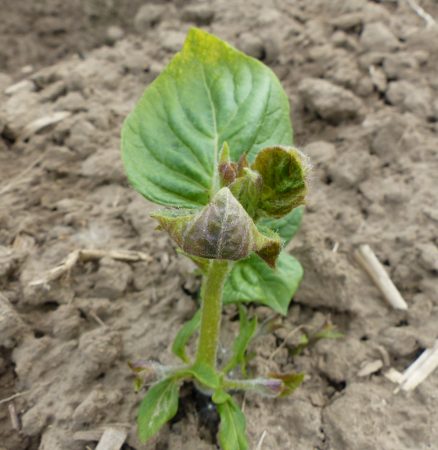
News
Crop Watch
Planting
Abnormal stem elongation seen in Ontario potato field
While the elongated stems stick out, this physiological problem resolves itself within two weeks without any impact on yield.
June 9, 2020 By Stephanie Gordon
 Abnormal stem elongation or "spindly stem" was spotted in an Ontario field in early June. Photos courtesy of Eugenia Banks.
Abnormal stem elongation or "spindly stem" was spotted in an Ontario field in early June. Photos courtesy of Eugenia Banks. The physiological disorder of abnormal stem elongation or “spindly stem” was detected in an Ontario field last week, according to potato specialist Eugenia Banks’ potato update.
Abnormal stem elongation develops in patches shortly after emergence but it is never widespread, Banks explains. “Plants outgrow this problem in about two weeks without any impact on yield or quality,” Banks continues. “At the end of the growing season you couldn’t distinguish which potato plants had this problem.”
Plants produce hormones called gibberellins that cause stems to elongate. Banks says challenging environmental conditions, such as cold temperatures, can cause a hormone imbalance in the potato plant that results in the elongation. In mid-May, parts of Ontario experienced a cold snap with nightly temperatures dipping below the freezing point.
However, Banks noted, herbicide damage from Linuron also can cause growth distortion in some potato varieties. Shepody is one potato variety that is very susceptible to Linuron damage. The distortion looks different, and can be accommodated with other symptoms such as the yellowing of potato plant leaves. In Banks’ webinar on physiological disorders, she noted that it’s usually the first plants at the beginning of the rows that often show this damage if it’s present.
Print this page


